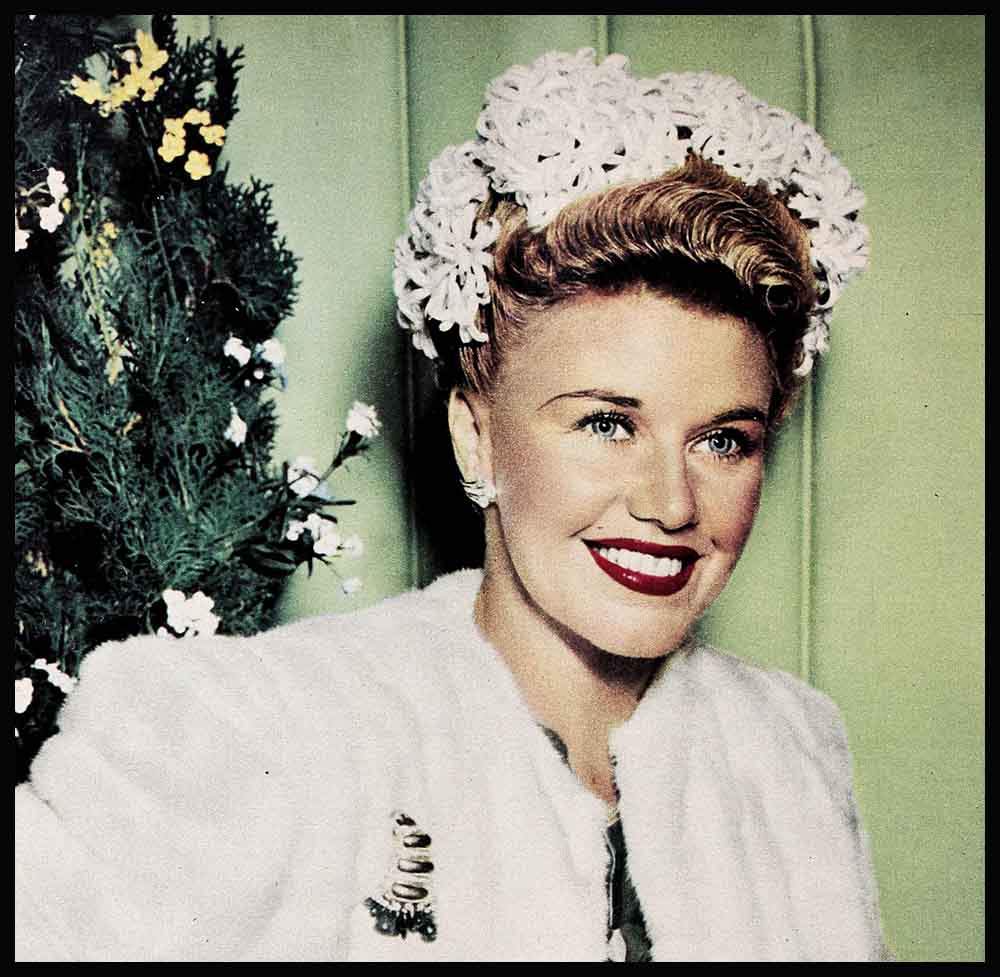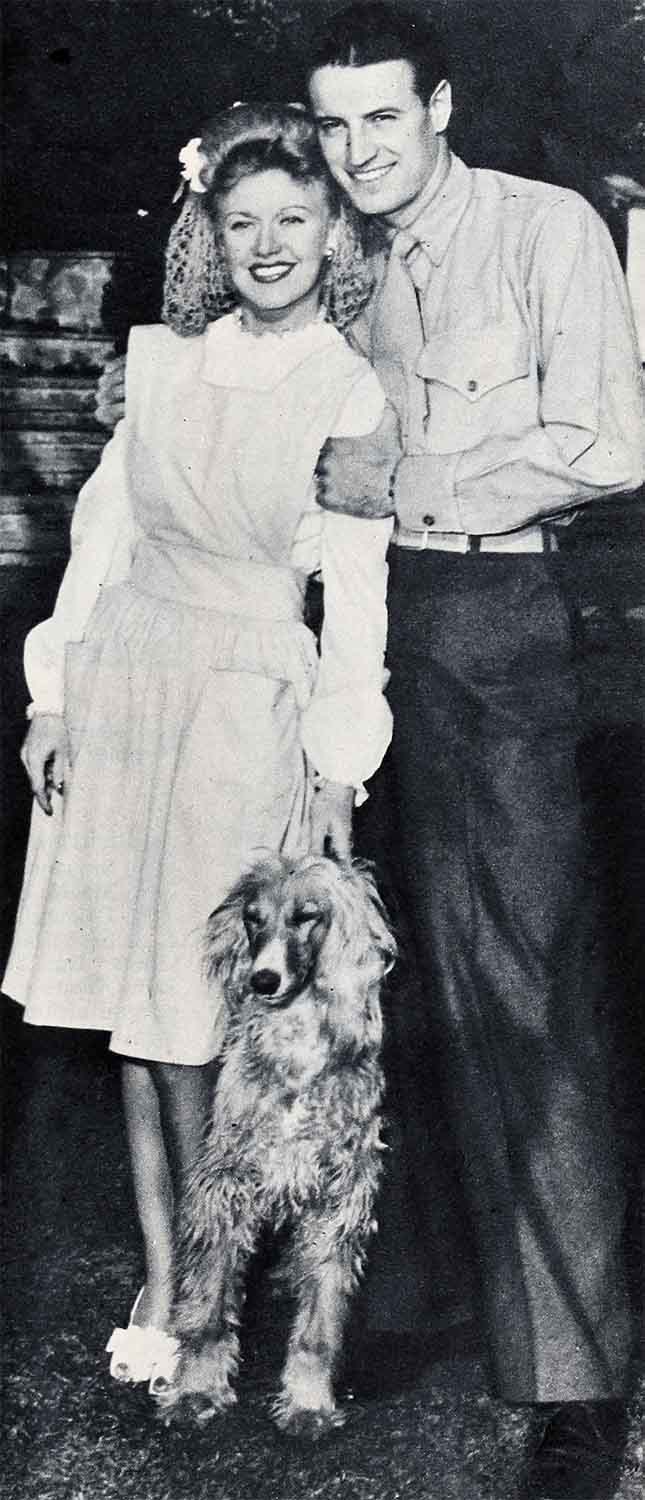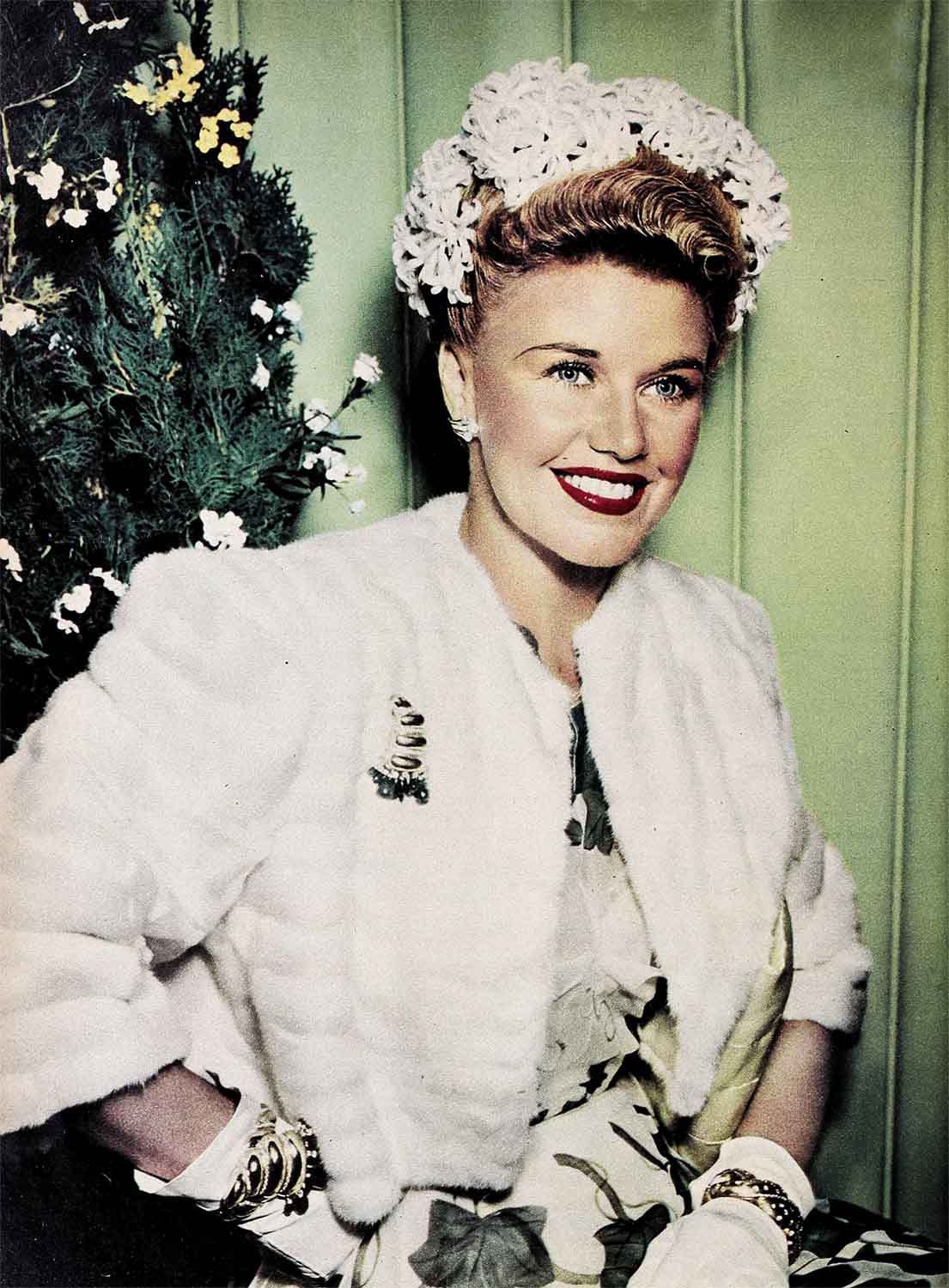
Wartime Wife
It was a night of glamour in Hollywood—glamour and drama. The Jack Bennys were giving a party at practically the highest peak of the war. Stars and more stars literally thronged to the white Roxbury Drive mansion. They filled the canvas-covered garden setting where a bountiful board was spread and charcoal braziers afforded warmth in California’s “winter time.”
In the midst of it all was Ginger Rogers, very joyous, very much in the spirit of things. She was taking the evening off—a rarity for her these days. The star of “I’ll Be Seeing You” arrived with a woman. For the moment Ginger was throwing herself into the camaraderie of the occasion, camaraderie born of the end of one year and the beginning of a new one—especially this significant year of 1945.
AUDIO BOOK
Just then a woman whom she knew passed by with her son, a lieutenant in the infantry who was home for the holiday. Ginger looked up, recognized her, saw the young officer with her and suddenly her face came aglow with tenderness and emotion.
“Oh, honey, are you happy! Are you lucky—having your soldier home with you! Don’t I wish I had mine here tonight!”
And with that one touch of sentiment, Ginger closed the door on the emotion she had briefly shown and became again light and gay. But the emotion had registered for the one or two people who had observed it, and on the woman to whom the comment had been made.
That’s the way it is with Ginger as a wartime wife. She has the bars up for any public investigation of her inner sentiments and feelings. Only if you catch her off guard, which is rare indeed, can you learn what her reactions are to the present phase of her life apart from her career. It is considerably more than a year ago that she said good-by to her husband of a comparatively few weeks, Sergeant Jack Briggs of the Marine Corps, for he has been in foreign service ever since then.
But Ginger will not discuss what it all means to her more than to say, “I guess the one thing common to all of us who have loved ones in the service is hope and prayer. There used to be an adage, ‘While men fight, women wait and weep.’ In this war it’s, ‘While men fight, women work and pray.’ Intensive work, intensive prayer are great sustaining forces.”

Ginger has set her star on a bright, particular goal. She will not capitalize on her marriage for publicity purposes. Her silence on the subject has been almost inviolable, yet it is known that she was with Jack constantly prior to his departure. If she did not appear depressed by the shortness of the days she had with him as his wife, then it was only because she is and always has been expert at concealing her most personal responses to life’s demands.
Ginger has a firm shell around her inner being. She had to acquire it because things worked out that way. She was pushed around considerably in the early days of her career. She has had to fight for all things she has won in the theater and the films.
She has had two unhappy marriages preceding the present one and happiness has been fleeting in this, so she falls back, as usual, on the old “heads up” attitude toward heartache and lets nobody know directly whether she has been hard hit or not. Yet certain facts speak for themselves.
For instance, she went to the Benny party alone, except for the woman friend, and she left it alone. She had a fleeting fling at good fellowship and then retired into her domain of solitude again.
And there is a record that she plays, over and over again, at nighttime when she returns from the studio. It’s a recording of a broadcast that she took directly off the air as the program came through from the South Pacific area. The show starred Jack Benny and the master of ceremonies was Sgt. Jack Briggs.
It is the Ginger Rogers policy of concealment of inner self which has perhaps caused her to be designated as one of Hollywood’s “difficult” stars. She does not conform to the gold-fish-bowl standards of living so prevalent in the film city. She has remained pretty much aloof and has never bent over backwards to please either her admirers or detractors. Thus she has remained true to herself.
For those who charge her with un-cooperativeness Ginger has this answer: “The work that one does in the studio is the first and most important thing. It requires time and thought, and energy and concentration. A break in the continuity of my work always sets me back. I know some actresses who have the gift of plunging into a scene, completing it, and then turning to something else to occupy their attention. I just happen to be the type that has to give fully to what I am doing, and when I am acting a part it entirely absorbs me and I generally can’t think of anything else.
“I’ve had lots of ups and downs in my life, plenty of rebuffs, but then so does everyone else, and if you can survive them, you will eventually be compensated. It’s all part of moving onward. There is no such thing as standing still. And I believe that if you have enough drive the plan of evolution, whatever it may be, will work out for you personally and that this idea can also be applied in a much larger way.
“For instance, however much the war might touch me personally, I don’t think I could regard it with anything remotely approaching hysteria. Because, again, it all conforms with the ebb and flow of life as we know it in this world. There are bound to be crises like this arising every so often, as anyone knows who has read history at all. What happens to people because of such events is very important but it can be matched by human experience all along the line.
“People say the men who are going to war will return completely disillusioned. I don’t agree with that in most cases, although there is bound to be some disillusionment connected with any sudden and drastic change in one’s life. A boy or girl who gets to a big city from a small town and returns, invariably finds the town has shrunk decidedly and that the people do not seem the same as they did before.
“So too, the men in the service, especially perhaps the fliers, have expanded their horizon far beyond any they have previously known, and necessarily will need to adjust themselves greatly if they want to take up the life they had formerly known. Many will not be able to make such adjustments and unquestionably there will be dreadful unrest. But, at the same time, who are we to say that this will not spell greater progress for everybody in the long run? Those who remained at home will also have to measure up to the new standards of life and living and fit into the broader ranges that the men in the service have viewed and known.
“All men who have gone to foreign countries, gone through battle, and endured the deprivations that are associated with the ghastliness of war, must necessarily have acquired new strength or character because of all this. And they shouldn’t be subjected to influences that tend to confine and limit them in their civic evolution, let’s say, after the war is over. They probably have the greatest contribution to make to the life of the future because of what they have been through. We should all be raised to greater heights of living and thinking because of what they endured—their baptism by fire.”
Few people are well acquainted with the thoughtful side of Ginger Gogers. She has a philosophy that is remarkably solid for a young woman, a knack for fitting everything into its pattern sooner or later. And that pattern is very sound because it has been built out of hard knocks and experience.

Ginger knows that work is the thing that carries most weight, day after day, in life. That you can depend on it and that one must be active in some way, even when the studios do not have any roles waiting for you. That’s one reason she purchased her ranch up in Oregon which can take a large complement of her time. She also has a reliable outlet for expression of the artistic in her sculpture. One of her best pieces is a head of her mother Lela, who is an associate producer at RKO studios, where Ginger was under contract for over twelve years.
The close association and devotion of Ginger and Lela is one of the great sagas of Hollywood. And the story of Ginger’s steady rise to stardom, beginning when she was a little girl with dancing feet that dangled from the top of her mother’s desk in a Texas newspaper office, gleams with the fine inspirational theme of maternal love coupled with cautious, astute guidance.
Ever since Ginger’s marriage, Lela has lived in a separate apartment and Ginger has remained in the modernistic home that they built a few years ago atop one of Beverly’s highest hills which commands a sweeping view of sea, city and valley.
It is there that Ginger spends most of her time, even when she isn’t working. She rarely, if ever, entertains on a big scale. When she does have friends in for dinner or supper, all formality is dispensed with and simplicity is the rule. The friends are usually of long standing, people she has known since she first came to Hollywood. Her secretary, Penny, may be the guest of the evening, or again she is apt to have a house guest, who may be a comparative stranger to her, yet with whom she shares some deep bond. Witness the long stay Mrs. Alvin Flanagan had with Ginger when she couldn’t find a hotel or house to live in. Mrs. Flanagan is the wife of a Marine who is serving with Ginger’s husband in the South Pacific and Jack wrote Ginger about her plight. So Ginger looked her up, found her and brought her out to her house to live until she could find quarters.
Bridge and a lot of small talk are two of the things that Ginger abhors and ducks away from assiduously. Also big parties.
“I love to meet and talk to people who are interesting and stimulating,” she said to me, “whether they have cultivated minds or whether they are simple and untutored, just so long as they have something to say that is worth listening to, or are interesting because of what they do. But I simply cannot stand the bores, no matter what their social or professional rating may be! As for bridge, I have never had time to play it and on those few occasions when I’ve been very social and tried playing ‘at it,’ I have secretly vowed never to waste that much time again. Invariably at such times I wish I were home reading some of the books I’ve been trying to lay my hands on, or playing some good music.”
A library of the classics and good books and a very fine collection of records, from symphonies and operas to jazz, take up a goodly space in Ginger’s home. Recently, too, she made an album of professional records of “Alice In Wonderland,” which has met with considerable popular approval.
She has always loved Alice, ever since she was a child, and in some respects there is a quality of both Alice and Wonderland about Ginger, despite her business acumen and her logical and meditative mind.
Only if she were to peer through the looking glass, she would not find her world topsy-turvy. She would see things in precise, systematic order, and maybe if she looked extra hard she might be able to glimpse the far road ahead . . . the road where she hopes to meet and join her husband when the war is ended . . . the road where they will stop and talk over plans for forming their own producing company, dedicated to the purpose of making only beautiful pictures and with Lela as a partner, of course!
Ginger has dreams but they’re always practically fashioned.
THE END
It is a quote. PHOTOPLAY MAGAZINE MAY 1945
AUDIO BOOK




